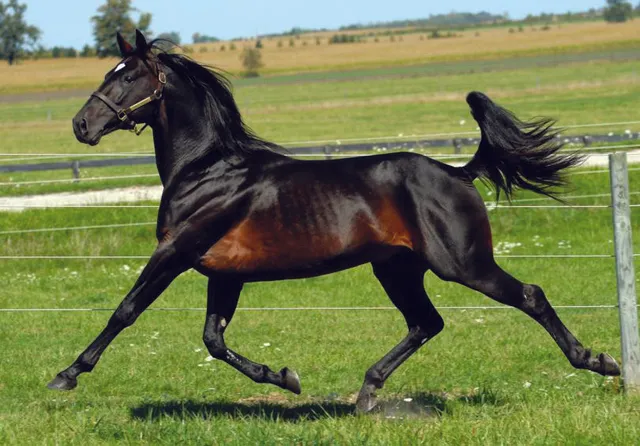Sweet Potato for Horse: A Complete Guide 2025
I originally started wondering about sweet potatoes for horses, when I thought of putting them in my horse feed. Sweet potatoes are considered a super food for people and when I started feeding them to my horse, I became intrigued in whether or not it was nutritious.
Well, after some research and time with them I learned they can be healthy when fed properly. Here is what I have learned about sweet potatoes and horses.
Introduction to Sweet Potatoes for Horses
Sweet potatoes are starchy, sweet-tasting root vegetables and a common food source for humans. Originally from Central and South America, they have become popular in many other countries because of their versatility and health benefits.
Sweet potatoes can also be used as a treat for horses, giving the more typical carrot or apple a run for their money. Like any new addition to the diet, though, you will want to know why they are good for your horse and how to feed them correctly.
Why Sweet Potatoes for Horses?
Having read what there is about sweet potatoes being good for horses, I leapt to the conclusion from their nutrient profile above that it might be so.
These are all nutrient-dense and high-fiber foods that can further supplement a horse’s typical diet. Moreover, their natural sweetness makes them a good fit for most horses (including mine).
Benefits of Sweet Potatoes for Horses
High Nutritional Value
The very first reason I began feeding sweet potatoes to my horse was because they are so packed with nutrients. They’re rich in:
- Vitamin A (Beta-Caroten): Supports vision, immune and reproductive health.
- Vitamin C: Helps as an antioxidant against oxidative stress.
- Vitamin E: Supports muscle recovery and general cellular health
Sweet potatoes also provide potassium and magnesium, two vital nutrients for muscle function and regulation of electrolytes.
Digestive Support
Sweet potatoes also contain fiber, which is yet another reason that I selected them. Sweet potatoes promote healthy digestion, one of many benefits Horses reep through a fibourous treat.
My horse appeared to like these treats just as much as other high-fiber snacks (including carrots) whilst receiving the added nutritional benefit.
Boosts Energy Levels
I use them in the winter as a natural part of a carbohydrate for my horse when they need that extra help with energy, as well as post workout/competition to aid recovery. These are excellent means of providing energy without resorting to processed feeds.
Can Horses Safely Eat Sweet Potatoes?
Toxicity Concerns
When I first started giving sweet potatoes to my horse, I looked it up first and made sure they were safe. The root itself is safe for horses, but I was surprised to learn that the leaves and vines from sweet potatoes can be toxic. Which is why I always make sure that it is only the root that gets exposed.
Safe Serving Sizes
To make sure she wouldn’t get too much (and to get her used to the organisation of proper meals) I started small with less than half a cup cooked, or really finely diced sweet potato.
And so slowly I worked it up to a cup, depending on the tolerance and size of my horse. Given the high starch content of many beans, moderation is key.
Nutritional Components of Sweet Potatoes
I was amazed to see the various benefits these sweet potatoes provided based on their nutritional composition:
- Vitamins: High vitamin a, C and E in advance fitness.
- Minerals: Potassium and magnesium are great for muscle health, while calcium is a boon to bones.
- The carbs and fiber: Not only do sweet potatoes serve as a sweet snack, but they also help with providing energy and support proper digestion.
Comparing Sweet Potatoes with Other Horse Treats
I compared sweet potatoes to other common horse treats when deciding treats for my horse:
Sweet Potatoes vs. Carrots
Carrots are a staple treat, but sweet potatoes have more calories and are great for underweight or very active horses! Although both are high in Vitamin A, sweet potatoes provide important nutrients like magnesium.
Sweet Potatoes vs. Apples
Although apples are appealing because of their juiciness some wisdom teeth horses or those with chewing problems may find them difficult to chew. Particularly when cooked, sweet potatoes are much softer and easier to eat.
Preparing Sweet Potatoes for Horses
Sweet Potatoes Cooked Whole vs Raw
At first, I thought the horses could eat sweet potato raw, but learned that cooked sweet potato is much safer and more digestible for horses. They are generally roasted/baked or steamed only from salt, sugar and spices.
To Peel or Not to Peel?
I want to feed my horses with the skin on, it has FT in it. But I always wash the satumado-imo well to get dirt and pesticides off.
Portion Sizes
I always started with a small amount of sweet potatoes — no more than a handful in the beginning. Eventually I tweaked the amounts as necessary, depending on my horse.
What Should You Do When Feeding Sweet Potatoes to Horses?
After some experimentation, I have discovered a few best principles for feeding sweet potatoes:
- Do: Small amounts are best to begin with, and look out for any negative reactions.
- Do: Treat sweet potatoes as a treat, not the main food source.
- Do not feed vines or leaves of sweet potato, as they are poisonous.
- Do not: Sweet potatoes to be given up with sugar, salt or masala.
What Are the Risks of Feeding Horses Sweet Potatoes
I had relatively good experiences but there are things you should be aware of:
- Overfeeding: Large quantities of sweet potato can cause digestive upset or weight gain.
- Choking Hazards: As with any food, always cut sweet potatoes into bite-sized pieces to avoid choking.
- Sugar load: Sweet potatoes should be excluded or given in very low quantities to the equines with insulin resistance & other metabolic diseases.
Sweet Potatoes for Special Needs Horses
I love sweet potatoes because their versatility for horses with special needs:
- Horses with Dental Issues: Cooked sweet potatoes are soft enough for older horses or those with missing teeth.
- Performance horses: They offer a boost of energy for working horses, assisting in recovery from strenuous workouts.
- Horses at Risk of Insulin Resistance: I also never feed sweet potatoes to horses with metabolic disorders such as Cushing’s disease or insulin resistance, due to the sugar content.
Sweet Potatoes as a Reward During Training
Sweet potatoes have been a fantastic training reward for me. This makes them very motivational, and my horse responds to them well. To keep balance, I do not allow them to make up more than 10% of the entire diet.
Sweet Potatoes as Part of a Complete Equine Diet
As a great introduction to my next topic on sweet potatoes, upon implementing this treat for my horse I knew it was crucial that I evened out this carbohydrate-laden vegetable with other nutrients.
A forage-first diet, with the majority of intake comprising hay or grass; Horses require a high fiber diet. Sweet potatoes are an occasional treat that should be fed sparingly, or else this order will quickly go out of balance.
Here is How I Added Sweet Potatoes to My Horse’s Routine
Instead of sweet potato being a regular part of the diet it became more of a treat. For example:
- Training Days: Gave a few bite sized pieces of cooked sweet potato after some good training
- Special Occasions: I used them in a celebration treat mix, so they were combined with apples and carrots.
The added benefit of this method is that my horse gets the advantages of sweet potatoes without the sugar overload or starch overload.
Sweet Potatoes and Feeding in Season
This is something I found out that sweet potatoes are especially helpful at certain times of the year:
- Winter Months: As forage quantity and quality drops, sweet potatoes can be used as an energy-rich supplement to aid in maintaining body weight and energy levels.
- Summer Months: In summer, sweet potato was given in limited amounts as hot weather adds extra sugar that gains weight or experiences metabolic stress.
I was then able to use sweet potato feeding to meet the seasonal needs of my horse, helping him stay healthy all year round.
Ideas for Offering Sweet Potatoes to Horses
I wanted to feed the family but have fun with how I prepared and served sweet potatoes. Below are some ideas that have worked for me:
Sweet Potato Mash
I cooked sweet potatoes, pureed them with a tbsp of my horse’s grain. Especially in the winter when my horse needed something warm and comforting.
Sweet Potato and Carrot Cubes
I steamed some cubes of sweet potato and carrots for an easy rural snack. He enjoyed the combo as it was a mainstay of textures and flavors.
Frozen Sweet Potato Bites
Over the summer, I blanched and froze small nuggets of cooked sweet potato for a cool hydrating snack. It was particularly a boon after long rides or during really hot days.
How to Tell If Your Horse Likes Sweet Potatoes
Horses have preferences just like us and I was interested to see how my horse would respond to sweet potatoes. These were the signs that confirmed to me he liked them:
- Devours: He got so excited to go for the sweet potato pieces I set out and quickly finished.
- Sweet Potatoes: Again, I observed no signs of digestive upset or behaviour change post-introduction.
- Expectation: Any time he saw me cooking sweet potatoes, he would be noticeably excited — ie nickering and/or pawing.
If you horse responds in kind, sweet potatoes may soon be on your list of their favorite treats.
Options Other Than Sweet Potatoes
Although I love giving sweet potatoes as an occasional treat, I started looking for replacements in order to diversify my horse’s diet. Below are a few I have previously used:
- Carrot Sticks and Apples: A staple snack that is easy to find and go-to favorite.
- Pumpkin: Another fall favorite that’s high in fiber and Vitamin A.
- Beet Pulp: An exceptionally fiber-rich feed-stuff that can be soaked and served as a top-dressing to the regular ration
They all have their pros and cons and I can rotate treats and keep a healthy balance.
Lessons for Feeding Sweet Potatoes
Here are some things I have learned about feeding sweet potatoes to my horse:
- How to Feed Sweet Potatoes: Important — sweet potatoes are not a substitute for hay or grass.
- Preparation is Key: Sweet potatoes are not harmful when cooked (and should never be consumed raw).
- You Should Always Evaluate: I always check my horse before giving new foods that the horse may become intolerant to, for example with sweet potatoes.
With these insights, I am now able to confidently use sweet potatoes as a delicious yet healthy treat in my horse’s diet.
Frequently Ask Questions
Here are some Faq’s related to this article.






